Florida College Annual Lectures (1974–2011)
Digital Logos Edition
Overview
The Florida College Annual Lectures (1974–2011) brings you thirty-eight years of the college’s annual lectures series in complete written form. Prior to the first published lecture series in 1974, only content outlines were available.
Each volume includes fifteen or more lectures from contributors from various biblical fields, and focus on a specific theme. These themes deal with modern issues and are supported by recent scholarship. Learn what true worship entails. Discover how God can restore your life. Challenge yourself to share the gospel message. The Florida College Annual Lectures (1974–2011) (38 vols.) contains both informative and stimulating topics that allow you to apply the biblical principles found in its lectures to your daily walk with Christ.
With Logos, every word is essentially a link! Scripture references are linked directly to the Bibles in your library—both the original language texts and English translations. Logos Bible Software allows you to quickly move from the table of contents to your desired content and search entire volumes and collections by topic, title, or Scripture reference, making Logos the perfect software to expand your understanding of the Word.
This title is included in the following collections
You can save when you purchase this product as part of a collection.
2025 Collector's Edition Libra...
$10,999.99$8,249.992025 Ultimate Library
$23,999.99$17,999.99

- Addresses contemporary issues from a biblical perspective
- Includes solid biblical teaching
- Provides practical ways to apply God's principles to daily life
- Title: Florida College Annual Lectures (1974–2011)
- Publisher: Florida College Bookstore
- Volumes: 38
- Pages: 8,669
- Biblical Authority: Its Meaning and Application
- Great Bible Doctrines
- The Restoration Heritage in America: A Biblical Appeal for Today
- Centers of Faith and Faltering
- Things Written Aforetime
- The Godly Family in a Sick Society
- The Lord of Glory: Studies in the Life of Christ
- They Being Dead Yet Speak
- Their Works Do Follow Them
- Romans for Every Man
- Ministering Obedience to Christ: Studies in Second Corinthians
- Humanism: Devotion to Man
- The Doctrine of Last Things
- Praise, Prayer, and Providence
- Hebrews for Every Man
- Minor Prophets for Every Man
- Reemphasizing Bible Basics in Current Controversies
- God's Work in God's Way
- Eternal Wisdom for Daily Living: Studies in the Wisdom Literature
- The Gospel and Epistles of John
- Overcoming with the Lamb: Lessons from the Book of Revelation
- In His Image: The Implication of Creation
- Christ and Culture at Corinth: Lessons from First Corinthians
- The Bible Doctrine of Sin
- Christ and the Church: Studies from Ephesians, Colossians, and Philemon
- A Place to Stand: Apologetics in an Uncertain Age
- The Present Truth: Studies in 1 and 2 Peter, James, and Jude
- Jesus for a New Millennium: Studies in the Gospel of Matthew
- A Man in Christ: Paul's Teaching on Spirituality
- The Gospel in the Old Testament
- If I Had One Opportunity: Urgent Messages for Today
- True Worship
- Portraits in Isaiah
- Back to the Beginning: Studies in Acts
- Challenges of Our Times: Some Answers for Young Christians
- Guard the Trust: Studies in Paul's Letters to Timothy and Titus
- Living in Captivity: God's People in a Time of Crisis
- "Trembling at My Word": God's Power for Restoration
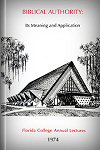
Biblical Authority: Its Meaning and Application
- Editor: Melvin D. Curry
- Publisher: Cogdill Foundation
- Publication Date: 1974
Contents:
- The Challenge to Scriptural Authority: Witchcraft
- The Challenge to Scriptural Authority: Demon Possession
- The Challenge to Scriptural Authority: Satanism
- The Lord's Appeal to Scripture As Authoritative: Matthew
- The Apostles' Appeal to Scriptural Authority (Acts 15)
- The Signs of An Apostle—The Purpose of Miracles
- The State of Israel and Biblical Prophecy
- Modern Views of the Kingdom
- The Cults View of the Future
- Apostolic Examples: The Lord's Day
- Apostolic Examples: The Lord's Supper
- Apostolic Examples: The Lord's Work in the Lord's Way
- The Good Work of Teaching: The Power of the Gospel
- The Good Work of Edification: The Power of Exhortation
- The Good Work of Discipline: The Power of Brotherly Love
- The Good Work of Defense: The Power of Warfare
- The Good Work of Righteous Living: The Power of Christ in Us
Melvin D. Curry retired after teaching for thirty-three years at Florida College. He also served as Chair of the Biblical Studies Department at Florida College.
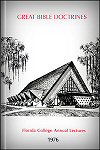
Great Bible Doctrines
- Editor: Melvin D. Curry
- Publisher: Cogdill Foundation
- Publication Date: 1975
Contents:
- Prayer
- False Approaches to God
- Meditation and Prayer
- Prayer and Providence
- Grace
- Salvation by Grace through Faith I
- Salvation by Grace through Faith II
- Salvation by Grace through Faith III
- Miracles
- Purpose and Occasion of Miracles
- Nature of Miracles, True Signs, and "Lying Wonders"
- Duration of Miracles
- God and His Word
- Almighty God
- Almighty Power in Inspiration
- The Almighty Word
- The Consummation of The Age
- Christ's Resurrection
- Resurrection of the Dead (and "the Rapture")
- The Second Coming of Christ and Judgment
- Heaven and Hell
Melvin D. Curry retired after teaching for thirty-three years at Florida College. He also served as Chair of the Biblical Studies Department at Florida College.
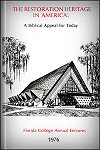
America is entering its bicentennial year. The nation is called upon to remember its heritage. In order to take advantage of that emphasis, the Florida College faculty presents this work to direct thinking toward the "heritage" left to us in the lives and writings of fellow Christians who have gone before.
One should recognize that here the child of God is totally committed to Christ. He pays no spiritual allegiance to any man or federation of men. His authority is the Word of Christ. His title is the name of Christ. His creed is the doctrine of Christ. His home is the church of Christ. His hope is the glory of Christ. No man started the church of which he is a part. The Restoration figures wrestled with the same issues (both doctrinal and ethical) with which we wrestle. The purpose of this study is to examine how they handled the issues and problems we are facing today.
Our "heritage" is the story of Christians in America who loved the truth and left us a chronicle of the results of their study and of the application of their conclusions as to their walk before God. Their record is not authoritative—at times is untrue or inconsistent—but it is inspiring and enlightening when one is searching seriously for the "ancient order."
Contents:
- The Personal Faith of the Restorers
- Prayer, Providence and the Restoration Leaders
- Christian Home Life and the Restoration Leaders
- Sacrifice and the Restoration Leaders
- Principles of Biblical Investigation
- How the Restorers Used New Testament Examples
- How the Restorers Dealt with Prophecy
- Avenues of Teaching among Christians in America
- The Role of Public Meetings and Debates
- The Role of Schools
- The Role of Written Publications
- Essential Concepts Analyzed by the Pioneers
- Election and Free Will
- Faith and Works
- Security of Believers
- Distinctive Bible Doctrines Restored
- The Basis of Apostolic Unity: Non-Sectarian Christianity
- The Restoration of Apostolic Worship
- Restoration of Congregational Independence
- Baptism: The Core of Controversy in the Restoration Movement
Melvin D. Curry retired after teaching for thirty-three years at Florida College. He also served as Chair of the Biblical Studies Department at Florida College.
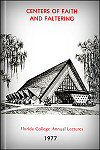
Many cities and provinces mentioned in the New Testament were pivotal centers for the early spread of the gospel. In these cities the gospel experienced both many triumphs and setbacks. Jerusalem and Antioch, on the one hand, were cities where faith abounded among Christians and from which the gospel pushed out to the ends of the earth. Corinth and Ephesus, on the other hand, presented the disciples of Jesus with serious threats to faith and morals because of the encroachment of Judaism and paganism, and in these cities the faith of many Christians floundered and their steps faltered. Thus, in these cities we today can see how the apostles of Christ took advantage of their opportunity to evangelize the world and to stem the resurgent tide of intellectual and moral infidelity.
The aim of this year's lectureship is to look more closely into the cultural, social, and moral impact of these New Testament geographical centers than has been done in any previous Florida College lectureship.
Although first-century Christians in many ways won the world to Christ, far too many Christians were in turn won by the world. Because Christians of the twentieth century are confronted with the same challenges their forefathers faced, the metropolitan areas of this century become our centers of faith and faltering.
Contents:
- The Beginning of the Gospel: "To the Jew First"
- Jerusalem: Where Time Became Full
- Jerusalem: The Disciples Multiplied
- The Transitional Period: "They Were Scattered Abroad"
- Samaria: Preaching Christ
- Caesarea: Call No Man Common or Unclean
- Antioch: Disciples Called Christians
- Galatia: Perversion of the Gospel
- The Expansion of the Gospel: "Also to the Greeks"
- Troas and Philippi: "Come Over and Help Us"
- Thessalonica: Trouble and Rest
- Corinth: "Fightings Within and Without"
- The Times of Ignorance: Paul at Athens
- Ephesus: "I Shunned Not . . ."
- Colosse: "Christ In You"
- Rome: "They of Caesar's Household"
- Men of Faith
- Peter: The Man of Faith
- Men of Faith: Barnabas
- Men of Faith: Paul
Melvin D. Curry retired after teaching for thirty-three years at Florida College. He also served as Chair of the Biblical Studies Department at Florida College.

Things Written Aforetime
- Editor: Melvin D. Curry
- Publisher: Florida College Bookstore
- Publication Date: 1978
Contents:
- Heroes of Faith
- Abraham: The Friend of God
- Moses: The Faithful Leader of God's People
- David: The Man after God's Own Heart
- Things Written Aforetime
- Purpose of the Old Testament
- Genesis: The Beginnings
- Israel: The Birth of a Nation
- The Law: Added Because of Transgressions
- Deuteronomy: The Covenant with Israel
- Joshua–Judges: The Sinful Nation
- Samuel–Kings: Collapse of a United Kingdom
- Ezra–Nehemiah: The Remnant Restored
- Prophetic Themes of the Old Testament
- Promises to Abraham
Melvin D. Curry retired after teaching for thirty-three years at Florida College. He also served as Chair of the Biblical Studies Department at Florida College.

Will Durant, the renowned historian, observed, "The family is the nucleus of civilization." Two thousand years before there was a United States, Confucius, the sage of China, said, "The strength of a nation is derived from the integrity of its homes." More reliable than these men are the inspired Scriptures: "Train up a child in the way he should go; and when he is old, he will not depart from it"; "Children obey your parents in everything, for this pleases the Lord"; "Husbands be considerate as you live with your wives and treat them with respect"; "A wife must not separate from her husband—and a husband must not divorce his wife." The Scriptures show that authority is learned in the home. If children do not learn it there, they will have no respect for teachers, government laws will be shunned, husbands will be despised by the women who marry them, men will not treat their wives properly, the aged will be looked upon with disdain, and ultimately, there will be no respect for God and His laws. The godly family will have to be strong if it intends to avoid these problems.
Living in a sick society does not help things one bit. This volume examines the causes, results, and cures of the social sickness. In doing so, biblical families are examined in their societies; symptoms of a sick society are reviewed; the susceptibility of the family is laid open; and, most importantly, specific treatments are given. It is hoped that the reader will put this information to use in the development of his family, and that he may aid others in the same quest.
Contents:
- Biblical Families in Sick Societies
- "Lot's Family," by Gene Tope
- "David's Family," by Aude McKee
- "Eli's Family," by Cliff Buchanan
- Symptoms of Society's Sickness Affection the Family
- "Disregard for Marriage," by Harold Comer
- "The Problem of the Aged," by Dee Bowman
- Susceptibility in the Family
- "Husband/Father," by Harold Trimble
- "Dangers to the Wife/Mother Role in the Home as Reflected in the Women's Liberation Movement," by Horrace Huggins
- "Children," by Conway Skinner
- Specific Treatment
- "Worship in the Family," by Tom Bunting
- "Moral Teaching in the Family," by Delton Porter
- "Family Together Activities," by David Tant
- Social Disease: Causes and Cures
- "The Disease: Humanistic Thinking," by Dave Bradford
- "Contagion: Social Pressures on the Family," by James Adams
- "Carriers: Mass Media and Secular Education," by James P. Needham
- "Prevention and Cure: The Great Physician," by James R. Cope
- "Disregard for Human Life: A Study of Abortion," John Clark
Melvin D. Curry retired after teaching for thirty-three years at Florida College. He also served as Chair of the Biblical Studies Department at Florida College.
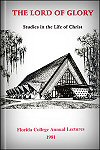
The Lord of Glory: Studies in the Life of Christ
- Editor: Melvin D. Curry
- Publisher: Florida College Bookstore
- Publication Date: 1980
Contents:
- An Overview
- "The Mind of Christ," by Dudley Ross Spears
- The Humanity of Jesus
- "'The Lowly Galilean,'" by Bill H. Reeves
- "The Courageous Controversialist," by Patrick Farish
- "The Obedient Servant," by Ben M. Shropshire
- "Take a Look: At the One Who Died for You," by Jerry Accettura
- The Deity of Christ
- "Eternal Existence," by James Sanders
- "Divine Names," by Harold Tabor
- "The Miracles of Jesus," by Wayne Chappell
- "The Lord's Resurrection," by Hoyt H. Houchen
- The God-Man
- "Our Merciful Mediator," by James L. Finney
- "Our Sinless Savior," by Herbert Fraser
- "Our Hope of Glory," by Irven Lee
- "The Lord of Glory," by Del Wininger
- The Timeless Teacher
- "The Sermon on the Mount: A Three-Part Series," by Paul Earnhart
Melvin D. Curry retired after teaching for thirty-three years at Florida College. He also served as Chair of the Biblical Studies Department at Florida College.
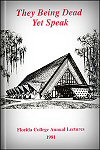
Ours is a "cut flower" generation, cautions Elton Trueblood. His well-chosen metaphor aptly describes the present religious climate. Christianity is waning partly because it has lost its serious sense of history. The real tragedy of the church's condition is that only those values can abide that are rooted deep in the soil of the past when truth was "once for all delivered to the saints." And that truth has been handed down from generation to generation, sometimes pure, sometimes perverted. Thus the men of the past who have led the church to where it is today still speak to us, if only we will listen.
The theme of this volume emphasizes the need to listen carefully to the men of the past. As the author of Hebrews exhorts, "Remember them that had the rule over you, men that spoke unto you the Word of God; and considering the issue of their life, imitate their faith" (Hebrews 13:7). But we must likewise listen critically because "there arose false prophets also among the people, as among you also there shall be false teachers who shall secretly bring in destructive heresies" (2 Peter 2:1).
Contents:
- "Men and Their Times: A Sociological Perspective of Christians in the Twentieth Century," by C. G. "Colly" Caldwell
- "M. C. Murfees: Careful Scholar and Astute Author," by Irvin Himmel
- "John T. Lewis: Beloved Builder of Churches," by Herschel E. Patton
- "R. H. Boll: Premillennial Visionary," by Robert C. Welch
- "Henry Leo Boles: Distinguished Preacher, Teacher, Debater, Commentator (1874–1946)," by Fanning Yater Tant
- "T. B. Larimore: Evangelist to the World," by Earl Kimbrough
- "Robertson Lafayette Whiteside: Bible Student Par Excellent," by Almon L. Williams
- "J. D. Tant: Colorful Frontier Preacher," by Claude M. Wilsford
- "C. R. Nichol: Princely Preacher, Debater and Author," by Connie W. Adams
- "N. B. Hardeman: Orator, Evangelist, Educator, and Debater," by James R. Cope
- "W. Curtis Porter: The Debater's Debater," by Eugene Britnell
- "Foy E. Wallace, Jr.: Militant Warrior," by James W. Adams
- "F. B. Srygley," by E. V. Srygley, Jr.
- "G. C. Brewer: Perennial Protagonist," by Ron Halbrook
- "Daniel Sommer: Thunder on the Right," by Earl E. Robertson
- "B. C. Goodpasture: Leader of Institutional Thought," by Ed Harrell
Melvin D. Curry retired after teaching for thirty-three years at Florida College. He also served as Chair of the Biblical Studies Department at Florida College.
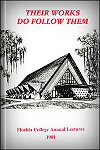
Their Works Do Follow Them
- Editor: Melvin D. Curry
- Publisher: Florida College Bookstore
- Publication Date: 1982
Contents:
- Attitudes
- "The Biblical Concept of Unity," by Robert F. Turner
- "Attitudes Affecting Unity among Brethren," by Homer Hailey
- "Who Are the Brethren of Christ? (The Question of Fellowship)," by Harry Pickup, Jr.
- Specific Issues
- "Sponsoring Church Arrangements: Herald of Truth (A Test Case)," by Hoyt H. Houchen
- "Concerns about Church-Sponsored Organizations: Orphan Homes," by A. C. Grider
- "Concerns about Non-Church Supported Separate Organizations (Schools and Papers)," by Marshall E. Patton
- "The Qualifications and Work of Elders," by J. Ed Nowlin
- "The Role of Women in the Church: Work and Worship," by Morris Norman
- "The Role of Preachers in the Church," by Bill Cavender
- "Bible Classes and Literature," by Elmer Moore
- "Controversies Concerning the Lord's Supper," by Tom Hickey
- "The Holy Spirit and the Christian," by Jim Puterbaugh
- "The Controversy Concerning the Christian's Relationship to Civil Government," by Quentin McCay
- "Divorce and Remarriage," by Aubrey Belue, Jr.
- "Controversy Concerning Unity Movements among Churches of Christ," by Steve Wolfgang
- Heritage, Horizons, and Destiny
- "Heritage, Horizons, and Destiny," by James R. Cope
Melvin D. Curry retired after teaching for thirty-three years at Florida College. He also served as Chair of the Biblical Studies Department at Florida College.
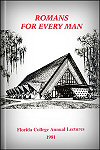
Romans for Every Man
- Editor: Melvin D. Curry
- Publisher: Florida College Bookstore
- Publication Date: 1983
Contents:
- "I Am Ready to Preach the Gospel," by Dee Bowman
- "The Incomparable God of Romans," by C. G. Caldwell, Jr.
- "The Justifying Christ of Romans," by Kenny Marrs
- "Men Without God," by Boyd Sellers
- "The Sins of Being Right," by Michael J. Schmidt
- "Abraham: Father of Faith and Hope," by Jim Poppell
- "Christ Versus Adam," by Billy Boyd
- "Free to Be Slaves," by Jack Hobby
- "Carnal Man and Spiritual Law," by Almon L. Williams
- "The Israel that Succeeded: A Spiritual Remnant," by Steve Patton
- "The Israel that Failed: A National Calamity," by Wilson Copeland
- "Gentiles Praising God," by Brent Hunter
- "The Church in Action," by Charles G. Goodall
- "'Why Dost Thou Set at Nought Thy Brother?,'" by Irven Lee
- "Present Your Bodies a Living Sacrifice," by Melvin Curry
- "More Than Conquerors," by Sewell Hall
Melvin D. Curry retired after teaching for thirty-three years at Florida College. He also served as Chair of the Biblical Studies Department at Florida College.
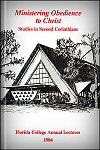
If you are looking for a series of studies that expose the heart of Paul and go straight to the root of what a Christian's life is all about, then this volume is for you. The emotional exhortations of Second Corinthians are quite different from the logical argumentation of Romans. Here Paul provides practical insights both to Christians and to congregations about the matters that range from "Spiritual Comfort" to "Merchandising the Church."
Unquestionably, Second Corinthians is a neglected book. We extend, therefore, our appreciation to those who wrote these lectures for preparing the way for our own independent study of this magnificent letter. And, as we read the book they have produced, we will be thrilled by the majestic description of "Triumph in Christ," deeply touched by the plea to "Penitent Christians," humbled by the study of Paul's thorn in the flesh, and filled with awe by the striking description of God's "Divine Jealousy." Indeed, there are many excellent expositions of Scripture in this volume.
The "ministry" discussed in this book not only includes the work of apostles and preachers of the first century but also embraces many ordinary aspects of the Christian's life of service. For example, the "ministry" of giving comfort to the down trodden and broken hearted are included in the term.
Contents:
- "Making Plans in Christ (1:12–24)," by Paul Earnhart
- "Spiritual Comfort (1:1–11)," by Phil Morr
- "Sorrow and Joy in Christ (Ch. 2)," by Peter J. Wilson
- "Triumph in Christ (2:12–17)," by Thaxter Dickey
- "Hearts and Stones (Ch. 3)," by Walton Weaver
- "The Gospel in Earthen Vessels (4:1–12)," by Jay Guyer
- "Seeing the Unseen (4:16–5:10)," by Bob Owen
- "Reconciliation: a New Ministry and a New Message (5:11–6:2)," by Ed Brand
- "The Christian's Separation (6:11–17)," by Arvid McGuire
- "Penitent Christians (Ch. 7)," by John Humphries
- "Gracious Christians (Chs. 8–9)," by W.C. Hinton, Jr.
- "The Christian's Warfare (10:1–6)," by Robert Jackson
- "Divine Jealousy (Ch. 11)," by Don Alexander
- "The Christian's Sufficiency (12:1–10)," by Kenneth Chumbley
- "Merchandising the Church (12:13–21)," by Barney Keith
- "Approved Christians (Ch. 13)," by Sam Binkley
Melvin D. Curry retired after teaching for thirty-three years at Florida College. He also served as Chair of the Biblical Studies Department at Florida College.
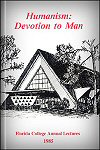
The 1985 Florida College lectures is a book that all Christians should read. The essence of humanism s nowhere better expressed than by Karl Marx, "Man is the supreme being for man." Generally speaking, there is no room for the God of the Bible in the humanist's worldview. Although many humanists claim to be religions, neither their religious views nor their ethical teachings are based upon biblical absolutes. In fact, most of them, as outright atheists, are thorough-going ethical relativists. Yet their ideas have permeated most of the religious, political, and educational institutions of the world. Indeed, their voices control the thinking of the masses by means of books, magazines, newspapers, radios, and TV Networks.
This book is designed to be a positive response to humanism. You will find on its pages not only scholarly arguments against humanism but also practical alternatives for everyday living. From James Needham's opening speech on "Sound the Alarm" to Homer Hailey's closing exhortation to "Constancy in Times of Conflict," you will find material that is fresh, exciting, and challenging. The hope for this volume is to provoke readers to do something to revoke the present monopoly and rising influence of humanism.
Contents:
- "An Overview: Sound the Alarm: The Threats of Humanism," by James P. Needham
- "Jesus and Darwin," by David A. Eakin
- "Jesus and Marx," by Melvin Curry
- "Jesus and Freud," by Harold V. Comer
- "The School System: Values Clarification," by Ward E. Ellsworth
- "Media Manipulation," by Guy E. Warner
- "Organized Humanism," by Allan Turner
- "The Christian and Human Rights," by Daniel N. Burton
- "The Sanctity of Human Life," by John H. Haley, Jr.
- "Situational Sexual Ethics," by Mike Willis
- "Divine Ethics in a Corrupt Society," by Homer Hailey
- "True Wisdom in an Age of Folly," by Homer Hailey
- "Reacceptance of Separateness," by Connie W. Adams
- "Reconsideration of Private Education," by John L. Clark
- "Recovery of Family Life," by Bob Buchanon
- "Constancy in Times of Conflict," by Homer Hailey
Melvin D. Curry retired after teaching for thirty-three years at Florida College. He also served as Chair of the Biblical Studies Department at Florida College.
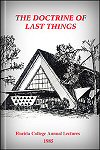
The Doctrine of Last Things
- Editor: Melvin D. Curry
- Publisher: Florida College Bookstore
- Publication Date: 1986
Contents:
- "The Word of God for Practice," by Kenneth L. Chumbley
- "The Hermeneutics of Dispensationalism," by James Sanders
- "The New Testament Pattern of Prophetic Literature," by Daniel H. King
- "Practical Problems of Premillennialism," by Ferrell Jenkins
- "The Tribulation and the Antichrist," by Rodney Miller
- "The Kingdom and the Church," by H. E. Phillips
- "Revival of Ancient Kingdoms," by Oscar Ellison
- "The Seventy Weeks of Daniel," by Phil Roberts
- "Eternal Punishment," by Ron Halbrook
- "The Day of the Lord," by Homer Hailey
- "Revelation 20:1–10," by Homer Hailey
- "The New Heavens and the New Earth," by Homer Hailey
- "'The Last Days,'" by Robert F. Turner
- "The Blessed Hope," by Dee Bowman
- "Suffering and Glory," by Colly Caldwell
- "AD 70: The End?," by Almon L. Williams
Melvin D. Curry retired after teaching for thirty-three years at Florida College. He also served as Chair of the Biblical Studies Department at Florida College.
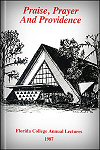
Acceptable service to God has always demanded the heart of the man as well as his hand. Christians live in Christ, and Christ lives in them. This year's lectureship deals with significant aspects of man's heart-felt worship directed toward God and of God's presence which affords help for His people.
Understandably, Florida College Lectures have frequently dealt with topics that are academic by nature. This year's series is biblically based, as always, but focuses on the spirit and emotion that exist between the Christian and his Lord. I think you will find that our speakers have done an exceptional job in focusing on what God says about these issues and on what God wants from us both in action and in feeling.
Several of the topics in this year's lectures are controversial. Respected brethren have differed over some of these matters for generations. From the manuscripts submitted, I have been particularly impressed with the manner in which these disputed areas are presented. As they should be, personal convictions are expressed and defended, but, also as it should be, in a spirit of kindness and understanding.
Contents:
- "Our God and Father," by John Kilgore
- "Praise Ye the Lord," by James R. Cope
- "Pray Without Ceasing," by Clinton D. Hamilton
- "My God Shall Supply Every Need," by Jim Poppell
- "The Praise of God by His Inanimate World," by Keith Sharp
- "The Praise of God by His Incomparable Word," by Frank J. Jamerson
- "The Praise of God by His Intelligent Worshipers," by Steve Cawthon
- "The Persons of Prayer," by Robert Harkrider
- "Regulations Concerning Prayer," by L. A. Stauffer
- "Acts Associated with Prayer," by Sewall Hall
- "Providence and the Problem of Evil," by Homer Hailey
- "Providence in God's Redemptive Plan," by Homer Hailey
- "Providence in the Christian's Life," by Homer Hailey"
- "Praying Through and the Second Work of Grace," by Jamie Sloan
- "Modern Day Faith Healing," by Ed Harrell
- "Tongues: Pentecostal Vs. Pagan?," by Melvin Curry
Melvin D. Curry retired after teaching for thirty-three years at Florida College. He also served as Chair of the Biblical Studies Department at Florida College.
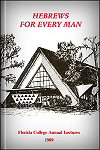
Hebrews for Every Man
- Editor: Melvin D. Curry
- Publisher: Florida College Bookstore
- Publication Date: 1988
Contents:
- "Key Concepts in Hebrews: Coming, Better, Perfect," by Weldon Warnock
- "Christ's Greatness: 'Heir of All Things,'" by James L. Finney
- "Christ's Provision: 'Author of Eternal Salvation,'" by Don Basset
- "Christ's Example: 'The Forerunner,'" by Jerry Accettura
- "Faith: 'Looking unto Jesus,'" by Harry E. Payne, Jr.
- "The Story of the Tabernacle," by Phil Roberts
- "The Rest that Remaineth," by Jay Bowman
- "The Word of God: 'Quick and Powerful,'" by C. Titus Edwards
- "Apostasy Vs. Steadfastness: 'Harden Not Your Hearts,'" by Bill Robinson, Jr.
- "Judgment: 'Our God Is a Consuming Fire,'" by Don Truex
- "Priesthood and Sacrifice," by Homer Hailey
- "The Two Covenants," by Homer Hailey
- "The Immovable Kingdom," by Homer Hailey
- "'Let Us Press On to Perfection,'" by Harry Pickup, Jr.
- "'Let Us Draw Near': An Invitation to Intimacy," by James W. Adams
- "'Let Us Go Outside the Camp,'" by Bill Hall
Melvin D. Curry retired after teaching for thirty-three years at Florida College. He also served as Chair of the Biblical Studies Department at Florida College.
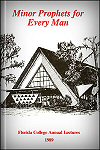
God said concerning Israel, "I have written to him the great things of my law, but they were counted as a strange thing" (Hos. 8:12). This statement is both a condemnation of the people and an expression of the need for the messages of such prophets as Hosea. The same criticism might be offered, in an accommodative way, concerning our understanding of the words of the Minor Prophets. For years, there has been a void in our knowledge of this part of the Bible. For one thing, until recently there have not been many good books available on the Minor Prophets. But, more importantly, we have not taken the time to put in the hours of hard work that are necessary in order to understand the prophetic writings. Surprisingly, however, when we knuckle down and study them, we discover that they are both fascinating and practical, and that they have much to say to God's people who, at present still live "in the midst of a crooked and perverse generation."
All of us have been blessed for some time now with Homer Hailey's works on the prophets, but his commentaries necessitate a thorough study of each prophet's writing in order to grasp the message. Our aim in this volume, however, is to provide snapshots and guidelines for the study of these prophets. A quick glance at the Table of Contents will indicate the rich variety of approaches to such study that are discussed in this book. There are chapters about principles of interpretation, key doctrines, and three individual prophetic books. Furthermore, there are personal profiles of Amos, Hosea, and Micah, three of the most personable prophets. And the other chapters deal with the prophets as preachers of the covenants and as antagonists of formalism, false religion, social sins, and the personal immorality of the society in which God's righteous remnant had to keep faith with God and His word.
Contents:
- "Preachers of the Covenant," by Ferrell Jenkins
- "Interpreters of Israelite History," by Phil Roberts
- "Spokesmen for God," by Robert Harkrider
- "Prophetic Images," by Melvin Curry
- "The God of the Nations," by John A. Humphries
- "Repentance," by Dick Blackford
- "The Messiah," by John Clark
- "Haggai," by Robert A. Bolton
- "Habakkuk," by Bob F. Owen
- "Malachi," by Gary Henry
- "Amos," by Brent Hunter
- "Hosea," by John M. Kilgore
- "Micah," by C. G. "Colly" Caldwell
- "Formalism and False Religion," by Foy Vinson
- "Social Sins and Personal Immorality," by James W. Ward
- "God's Righteous Remnant," by Robert Jackson
Melvin D. Curry retired after teaching for thirty-three years at Florida College. He also served as Chair of the Biblical Studies Department at Florida College.
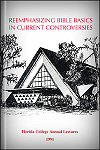
Contents:
- "Walking in the Old Paths," by Melvin Curry
- "Christ: 'The Head over All Things to the Church,'" by Harry Pickup, Jr.
- "Christ: Center of the Gospel and the Doctrine," by Connie W. Adams
- "Christ: The Savior of the Church," by Dale Smelser
- "Elements of the Gospel: Facts, Commands, Promises," by Berry Kercheville
- "Obedience to the Gospel," by Morris Hafley
- "The Power of the Gospel to Dave," by Tom M. Roberts
- "The Structure of the Church," by Maurice Barnett
- "The Worship of the Church," by Dan Petty
- "The Work of the Church," by Hoyt Houchen
- "The Authority of the Bible: Should We Seek a 'New Hermeneutic'?," by C. G. "Colly" Caldwell
- "Inspiration of the Bible," by James E. Cooper
- "The Canonicity of the Bible," by Martin Pickup
- "Departures from the Old Paths," by Grover Stevens
- "Pharisaism in the Way," by Frank Jamerson
- "The End of the Journey," by James R. Cope
Melvin D. Curry retired after teaching for thirty-three years at Florida College. He also served as Chair of the Biblical Studies Department at Florida College.
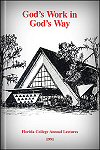
This series of lectures complements last year's series Reemphasizing Bible Basics in Current Controversies. However, the point of emphasis has changed. the latter stressed the authorized ways that God's work is to be done; the former underscores the work itself and how individuals and churches should seize the opportunities at hand to do God's work in God's way. The intense interest in evangelism today is leading to an uncommon awareness of needs both at home and abroad. Doors of opportunity are opening everywhere. Individuals are rising to the challenge. Churches seem eager to become involved in sending out workers and supplying their needs. This is an exciting time in which we live, and excitement breathes on nearly every page of this book.
Each year the Bible faculty at Florida College seeks to serve the public of this institution by presenting a challenging and informative series of lectures. Our interest is especially in the parents of our current students as well as those of prospective students. The lectures are designed for them and their children. Because these lectures are published each year, you have the privilege of enjoying what goes on here at the College in late January or early February. Affectionately, we sent forth this volume in hope that our labor of love will accomplish its intended purpose.
Contents:
- "Working in All the World," by Sewell Hall
- "God's Eternal Purpose," by Leon Goff
- "Revealing the Mystery," by Mike Wilson
- "Providing the Opportunities," by Matt Qualls
- "Preparation for the Work," by Royce Chandler
- "Evangelizing the Lost," by Charles G. Goodall
- "Strengthening the Brethren," by Leslie Diestelkamp
- "Equipping the Saints," by Floyd Chappelear
- "Supporting the Work," by James P. Needham
- "Overcoming Obstacles," by Jady W. Copeland
- "The Good Samaritans," by Jefferson David Tant
- "Given to Hospitality," by David Arnold
- "In the World but Not of the World," by Douglas G. Barlar
- "Leading in the Work," by James D. Yates
- "Working to the Glory of God," by Aude McKee
- "Unacclaimed Heroes of the Faith," by Dee Bowman
Melvin D. Curry retired after teaching for thirty-three years at Florida College. He also served as Chair of the Biblical Studies Department at Florida College.
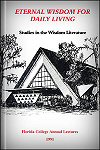
Contents:
- "The Beginning of Wisdom," by Bob F. Owen
- "Walking in Righteousness," by Charles E. Murray
- "The Wise and the Fool," by Jesse Curtis Pope
- "The Young and the Old," by E. Glen Barnhart
- "Wisdom and the New Testament," by David Thomley
- "The Challenge of Suffering," by Conne W. Adams
- "Wisdom for Husband and Wife," by Bobby Witherington
- "Train Up a Child," by Gary Ogden
- "Skilled in Work," by Randy Pickup
- "Friends and Neighbors," by Clinton Douglas, III
- "God's Ideal Man and Woman," by Paul Earnhart
- "A City Without Walls," by Forrest D. Moyer
- "The Tongue of the Wise," by Victor McCormick
- "Is Money the Answer to Everything?," by Brian V. Sullivan
- "Enjoyment of Life in a Broken World," by Daniel King
- "Hear the Conclusion," by John Clark
Ferrell Jenkins was Chair of the Biblical Studies Department at Florida College from 1991 to 2001. Prior to that, he taught Bible there from 1969 to 1984.
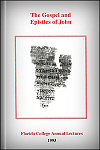
Of the original apostles of Christ no one wrote more of the New Testament than John. We believe that these books—the gospel of John, First John, Second John, Third John, and Revelation—were actually written by John the son of Zebedee. These books are part of God's revealed will to us and they are filled with valuable lessons.
John explains that the purpose of his account of Jesus is to provide evidence to cause us to believe "that Jesus is the Christ, the Son of God; and that believing you may have life in His name" (John 20:30–31). He tells us that the first epistle is written to those who believe "in order that you may know that you have eternal life" (1 John 5:13). These two books are indispensable to the Christian.
The 1993 annual Florida College lecture program is built around themes drawn from the gospel and epistles of John. This collection of lectures should prove helpful to students of these books for many years.
Contents:
- "That You May Believe," by C. G. Caldwell, III
- "John: His Life and Writing," by Clark Dugger
- "The Word Was God," by Wayne Goff
- "The Word Became Flesh," by Max Dawson
- "The Lamb of God," by Gardner Hall
- "Jesus: 'I Am the Good Shepherd,'" by Ferrell Jenkins
- "The Progress of Belief and Unbelief," by Jack Owen
- "Signs and Claims of Jesus," by Rick Lanning
- "Jesus and the Holy Spirit," by Lewis Willis
- "Jesus and the Individual," by Larry Houchen
- "Jesus: 'I Am the True Vine,'" by Ralph Walker
- "Life, Light and Love," by Jerry Earnhart
- "Knowing That You Have Eternal Life," by William B. Norris
- "Fellowship and the Apostolic Teaching," by Ray Ferris
- "Love Not the World," by Michael Grushon
- "Jesus: 'I Am the Resurrection and the Life,'" by Don Truex
Ferrell Jenkins was Chair of the Biblical Studies Department at Florida College from 1991 to 2001. Prior to that, he taught Bible there from 1969 to 1984.
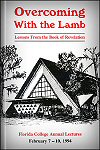
Last year's lectures were from the gospel and epistles of John. This year we continue and complete our study of John's writing with lectures drawn from the book of Revelation. Of the original apostles of Christ, no one wrote more of the New Testament than John.
Many Christians shy away from the book of Revelation for several reasons:
- Revelation is apocalyptic, a certain kind of literature well known in the ancient world but not so common to us
- The book of Revelation seems to attract fanatics and many false systems are built on their interpretations
- Revelation draws heavily upon the Old Testament for its images.
In planning this series of lectures, the Biblical Studies faculty felt it was necessary to present a consistent viewpoint. The one presented here is commonly known as the preterist view. Those who hold this view are amillennial and believe that Revelation was addressed to the churches of Asia at the close of the first century to prepare them to face the forthcoming persecution by the Roman Empire. We believe that Revelation has lessons of lasting value for Christians of all ages and that it provides encouragement and great assurance for us today.
The lectures presented in this book provide an overview and introduction to Revelation and take the reader through the text. The book is not a complete commentary on Revelation but it should serve admirably in helping readers to understand the book.
Contents:
- "Overview of the Book of Revelation," by Daniel King
- "Introduction to the Book of Revelation," by Ferrell Jenkins
- "The Throne Scene," by Marty Pickup
- "The Seven Seals," by Brooks Cochran
- "The Seven Trumpets," by Matt Qualls
- "Portraits of Jesus in Revelation," by Weldon Warnock
- "The Woman, the Dragon, and the Male Child," by Steve Dewhirst
- "The Beasts from the Sea and the Earth," by David McClister
- "The Lamb on Mount Zion," by Ray Madrigal
- "The Seven Bowls of Wrath," by Frank Jamerson
- "Christ Among the Lampstands," by Robert Harkrider
- "The Great City of Babylon," by Wilson Copeland
- "The Divine Warrior," by Frank Walton
- "The Binding of Satan and the Judgment," by Clinton D. Hamilton
- "The New Heavens and the New Earth," by David Barnes
- "Jesus: The Root and Offspring of David," by Kenneth Chumbley
Ferrell Jenkins was Chair of the Biblical Studies Department at Florida College from 1991 to 2001. Prior to that, he taught Bible there from 1969 to 1984.
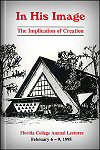
"Let's start at the very beginning! A very good place to start." That's what Maria told the VonTrapp children when she wanted to teach them to sing. It's good advice in the study of the Bible too. The lectureship this year draws its theme from the book of Genesis. The message of Genesis is highly relevant to the conditions we are facing today. The implication of creation is evident. If man has been created in the image of God, he is responsible to God and must in every way and in every relationship bring his life into harmony with the will of God.
Concerns about the nature of man, society, the role of government, capital punishment, the environment, gender differences, and the home are just a few of the current issues addressed in Genesis and developed by the speakers on this lectureship. Speakers from across the nation have worked on the topics selected by the Biblical Studies faculty to make this series of lectures educational and practical. They demonstrate not only a knowledge of the Scriptures but an awareness of current trends in our society which threaten to undermine the biblical standards.
Contents:
- "In His Image: An Overview," by Curtis Pope
- "God's Image in Christ," by Joseph Casimier
- "Living in His Image," by Donald Willis
- "'They Shall See His Face,'" by Sewell Hall
- "Challenges from Evolution," by Tom Kinzel
- "Challenges from Psychology and Sociology," by Thaxter Dickey
- "New Age Concepts of Man," by Warren Berkley
- "Dominion: Granted in Creation," by Brent Lewis
- "Dominion: Exercised in Stewardship," by Tony Mauck
- "Dominion: Lost and Regained," by Richard D. Copeland
- "Male and Female in Nature," by Wayne Galloway
- "Male and Female in the Home," by Barry Hudson
- "Male and Female in the Church," by Melvin D. Curry
- "'Male and Female' in Galatians 3:28," by Hiram Hutto
- "'Male and Female in the Church': A Response," by Gary Henry
- "The Influence of the Feminist Movement on Churches of Christ," by Mike Willis
- "The Role of Government," by Donald Bunting
- "The Role of Science," by Larry Dickens
Ferrell Jenkins was Chair of the Biblical Studies Department at Florida College from 1991 to 2001. Prior to that, he taught Bible there from 1969 to 1984.
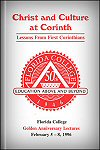
The lectureship for this year draws its theme from Paul's first epistle to the church at Corinth. Corinth was the capital of the Roman province of Achaia during New Testament times. Recent archaeological evidence as well as history shows that the city, though located in Greece, was thoroughly Roman in character. The saints at Corinth faced problems peculiar to Roman culture.
We know more about a larger number of problems faced by the Corinthians than any other first century church. Nearly every chapter of Paul's letter to the church at Corinth contains one or more problems which reflect the cultural setting of the church. Scan the book and you will see problems relating to human wisdom and leadership, division, immorality, use of the law courts, issues concerning marriage, sexual abstinence, social mobility, personal rights, the role of man and woman, spiritual gifts, and the doctrine of the resurrection.
Contents:
- "Christ and Culture at Corinth: An Overview," by Ferrell Jenkins
- "Corinth: A Divided Church," by C. G. "Colly" Caldwell
- "'Sanctified in Christ,'" by Martin Pickup
- "Let All Things Be Done in Love," by H.E. "Buddy" Payne, Jr.
- "Paul's Work at Corinth," by Mike Willis
- "The Wisdom of God Versus the Wisdom of Man," by Bob Hutto
- "The Corinthians and Their Teachers," by Frank Himmel
- "Clean Out the Old Leaven," by Jim Jonas
- "Lawsuits With One Another," by Earl Kimbrough
- "Questions About Marriage," by Bob Waldron
- "Personal Liberty and the Brethren," by Bob Dickey
- "Take Heed Lest You Fall," by Douglas K. Seaton
- "Relationship of Man and Woman," by Randy Harshbarger
- "When You Come Together," by Bill Feist
- "Concerning Spiritual Gifts," by Carl McMurray
- "The Resurrection: Each in His Own Order," by David Owen
Ferrell Jenkins was Chair of the Biblical Studies Department at Florida College from 1991 to 2001. Prior to that, he taught Bible there from 1969 to 1984.
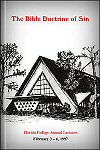
The theme for this year's lectures is both timely and practical. Almost everyone admits to being against sin, but not everyone can define and recognize it. It is important for God's people to be reminded again and again of the terrible nature of sin and of its consequences. The modern concepts of sin which think only in terms of "weaknesses" and "faults" are totally inadequate. We must see sin as an affront against God!
The reality of sin and its far-reaching effects are made clear in the Bible. Paul reminds us: "Therefore, just as through one man sin entered into the world, and death through sin, and so death spread to all men, because all sinned—" (Romans 5:12).
The death of Jesus best illustrates the terribleness of sin. Jesus said, "Greater love has no one than this, that one lay down his life for his friends" (John 15:13). Paul reminds us that Jesus gave His life for those who were His enemies: "But God demonstrates His own love toward us, in that while we were yet sinners, Christ died for us" (Romans 5:8). This was the way chosen by God before the foundation of the world to bring about our redemption (Ephesians 1:4–7; 1 Peter 1:17–21).
Contents:
- "What is Sin?," by Bob Buchanon
- "The Word: Safeguard Against Sin," by Ed Harrell
- "Perfecting Holiness," by Bill Hall
- "Sin and the Nature of Man," by Daniel W. Petty
- "The Nature of Temptation," by Rickie Jenkins
- "Conviction of Sin," by Ardie P. Brown, Jr.
- "Sins of Omission," by Michael L. Vierheller
- "Sins of the Heart," by R. J. Stevens
- "Atonement for Sin," by Bill Moseley
- "The Sin of Division," by Al Craig
- "Confession of Sins," by Bobby L. Graham
- "Sins of the Tongue," by Albert R. Dickson
- "The Sin Against the Holy Spirit," by Stephen Reeves
- "Sins in the Home," by Robert E. Speer
- "The Punishment of Sin," by Thomas L. Andrews
Ferrell Jenkins was Chair of the Biblical Studies Department at Florida College from 1991 to 2001. Prior to that, he taught Bible there from 1969 to 1984.
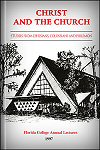
Contents:
- "The Preeminent Christ," by Ferrell Jenkins
- "The Church That Christ Built," by John Kilgore
- "The Full Armor of God," by Gary Ogden
- "Introduction and Background to Ephesians, Colossians, and Philemon," by David Posey
- "God's Purpose in Christ," by Gary Kerr
- "God's Power of Life Over Death," by Reuben Amador
- "Salvation by Grace Through Faith," by Patrick Farish
- "The Holy Spirit in Ephesians and Colossians," by Harry Osborne
- "Reconciled in One Body," by J. Leslie Maydell
- "The Revelation of the Mystery," by Stan L. Caldwell
- "Christ's Gifts for Perfecting the Saints," by Jeff Smelser
- "Warnings to the Saints," by Jim Deason
- "Walking Worthy of Your Calling," by Huey Hartsell
- "The Christian in the Workplace," by Ken Weliever
- "Family Relationships in Ephesians and Colossians," by Robert Gabhart
Ferrell Jenkins was Chair of the Biblical Studies Department at Florida College from 1991 to 2001. Prior to that, he taught Bible there from 1969 to 1984.
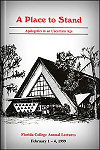
"Give me a place to stand and I will move the earth." These words are attributed to Archimedes, the third century BC Greek mathematician, physicist, and inventor who proved the law of the lever by geometry. Every person needs a place to stand in order to be effective in life. Christ and the Bible give one a place to stand.
The time in which we live has been described as the postmodern age. It is an age characterized by an absence of absolute truth and tolerance of every view, even contradictory ones, as being equally valid. The greatest sin in the postmodern world is lack of tolerance. How, then, can one insist that the Bible is the absolute truth of God? How can one say that Christ is the only way of salvation? Or that there is an absolute standard of morality?
If one accepts the postmodern view his attitude toward the Bible, Christ, and morality will change. Our speakers this year are challenging the assumptions of postmodernism and showing us that we do have a place to stand. The worldview of the Christian provides not only a vantage point from which to view the postmodern world, but a firm place to stand in a world that seems to be made of sand.
Contents:
- "'Be Ready Always': The Biblical Ground for Apologetics," by C.G. "Colly" Caldwell
- "The Real Jesus," by Mike Wilson
- "Apologetic Value of a Godly Life," by Dee Bowman
- "The Rise of Unbelief: Apologetics in Today's World," by Melvin D. Curry, Jr.
- "Classical Proofs for God's Existence," by Tom Moody
- "Inspiration and Revelation," by T. Doy Moyer
- "The Role of Miracles," by Mark Roberts
- "The Challenges of Humanism," by M. Thaxter Dickey
- "The Challenge of World Religions," by Curtis Pope
- "The Problem of the Canon," by Shane Scott
- "Fulfilled Prophecy," by Doug Roush
- "Faith and Reason," by Ray Madrigal
- "The Problem of Evil," by L. David McClister
- "The Historical Accuracy of the Bible," by Don Bassett
- "My Hope Is Built on Nothing Less Than the Bodily Resurrection of Jesus," by David West
Ferrell Jenkins was Chair of the Biblical Studies Department at Florida College from 1991 to 2001. Prior to that, he taught Bible there from 1969 to 1984.
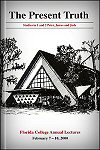
The epistles of 1–2 Peter, James, Jude, 1–3 John, (and sometimes Hebrews) are referred to as the Catholic or General Epistles. The term catholic means universal, and is applied to these epistles because, with the exception of 2–3 John, they are not addressed to the saints in a specific location. They bear the titles of the authors, and the identity of the intended audience is rather general. Because they are not addressed to a specifically named group of believers they contain much practical material of use to Christians of every age and location.
The epistle to the Hebrews and the three epistles of John have been covered in previous lecture series. For this series, the epistles of 1–2 Peter, James, and Jude have been selected. These General Epistles provide much material for help in practical, day-to-day living.
The keynote of the lectures has been selected from 2 Peter 1:12. The Apostle Peter speaks of "the truth which is present with you." That truth, which was the word of God as spoken by Christ and His apostles and prophets, is the same truth which is present today. It is the truth to which those associated with Florida College are committed.
Contents:
- "The Present Truth," by Robert F. Harkrider
- "Holy in All Manner of Living," by Harold E. Turner
- "The Day of the Lord," by Robert M. Jackson, Jr.
- "Introduction to the General Epistles," by Thomas H. Hamilton
- "Count It All Joy," by Wilson Adams
- "The Nature of Temptation," by Jon W. Quinn
- "Faith and Works," by Jim McDonald
- "Taming the Tongue," by Micky D. Galloway
- "Friendship with the World," by Kieran D. Murphy
- "Living Hope," by Ira L. Lynn
- "False Teachers Among You," by Frank J. Jamerson
- "Grow in Grace," by Joseph P. Olson
- "Offer Up Spiritual Sacrifices," by William M. Shanks
- "Honor the King," by Dennis G. Allan
- "Shepherd the Flock," by Thomas M. Nelson
Ferrell Jenkins was Chair of the Biblical Studies Department at Florida College from 1991 to 2001. Prior to that, he taught Bible there from 1969 to 1984.
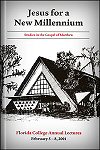
Jesus came to earth at precisely the right time to accomplish the will of God in the salvation of mankind. Paul calls it the "fullness of time" (Gal. 4:4). An angel informed Joseph of the purpose of Jesus' coming in these words: "And she will bear a Son; and you shall call His name Jesus, for it is He who will save His people from their sins" (Matt, 1:21). The common tendency among men to cast aside the old and seek the new must be rejected in this case as a tragic mistake. "Jesus Christ is the same yesterday and today, yes and forever" (Heb. 13:8). The lecture theme has been chosen because it sets forth our conviction that Jesus provides the solution to the questions and challenges for the third millennium since His coming as He has for the previous millennia. These lectures are based on the teachings of Jesus as presented in Matthew's gospel and are much needed in our time.
Contents:
- "Yesterday, Today, and Forever," by Martin Pickup
- "Make Disciples of All Nations," by Sewell Hall
- "Take Up Your Cross," by James M. Jonas
- "Born to Be King," by Steve Hardin
- "To Fulfill All Righteousness," by John D. McPherson
- "The Temptation of Jesus," by Phil Roberts
- "The Gospel of the Kingdom," by Kevin A. Sulc
- "Jesus the Master Teacher," by Mark W. Mosely
- "'We Beheld His Glory': The Transfiguration," by Shane Scott
- "'What Manner of Man Is This?,'" by Gene Taylor
- "Surpassing Righteousness," by Steve Kearney
- "Taking Up the Cross," by Jesse Curtis Pope
- "Do Not Be Afraid: He Is Risen," by Scott Smelser
- "What God Has Joined Together," by Donnie V. Rader
- "The Wide and Narrow Way," by Gerry Sandusky
Ferrell Jenkins was Chair of the Biblical Studies Department at Florida College from 1991 to 2001. Prior to that, he taught Bible there from 1969 to 1984.
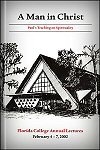
Jesus identified the great and first commandment as loving God with all of one's heart, soul, and mind (Matt. 22:37–38), and the disciple's first priority as seeking His kingdom and His righteousness (Matt. 6:33). Paul the Apostle throughout his letters presented these great principles as the essence of true discipleship and reflected them in his own life. The "spiritual man" is the one who "walks by the Spirit" (Gal. 5:16), is a "servant of righteousness" (Rom. 6:17–19), has been "crucified with Christ" (Gal. 2:20)—in short, one who possesses the "mind of Christ" (Phil. 2:5). From Paul we learn that our highest aspiration in this life is to "know Christ," to "gain Christ," and to be found "in Him" (Phil. 3:8–9). Surely there is no greater goal for the Christian.
The theme for this year has been chosen because it addresses the need that we all have as Christ's disciples to be "spiritual" people in the true and scriptural sense of the term. The lessons are based primarily on various passages from Paul's epistles. Fifteen capable and devoted preachers of the gospel from across the nation prepared these lessons and offer them in this volume.
Contents:
- "The Spiritual Man," by Paul Earnhart
- "False Measures of Spirituality," by Weldon E. Warnock
- "'Christ Lives in Me,'" by Don Truex
- "Conversion: From Sinner to Saint," by Church Durham
- "Hindrances to Spiritual Growth," by Gary N. Patton
- "Christ Dwelling in the Heart," by David Schmidt
- "The Fruit of the Spirit," by Johnny Felker
- "The Importance of Spiritual Growth," by Lowell Sallee
- "Paul in Prayer," by Kyle Pope
- "Walking by the Spirit," by David Diestelkamp
- "Spiritual Service and Worship," by Jody Broyles
- "That I May Know Him," by Gene Tope
- "The Word of His Grace," by Bruce Hudson
- "Union With Christ," by Tommy Peeler
- "Bearing Up Under Adversity," by Roger Shouse
Daniel W. Petty is Chairman of the Biblical Studies Department and Professor of Biblical Studies and Social Science at Florida College.
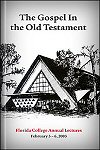
Paul wrote to the Christians in Rome that "whatever was written in earlier times was written for our instruction, so that through perseverance and the encouragement of the Scriptures we might have hope" (Rom. 15:4). He said to Timothy "that from childhood you have known the sacred writings which are able to give you the wisdom that leads to salvation through faith which is in Christ Jesus" (2 Tim. 3:15). Indeed, the Jews were entrusted with the "oracles of God" (Rom. 3:2) which told of the promised Messiah. The Law at its best served as a "shadow of the good things to come" (Heb. 10:1). The universality of the gospel was indicated as "The Scripture, foreseeing that God would justify the Gentiles by faith, preached the gospel beforehand to Abraham, saying, 'All the nations will be blessed in you'" (Gal. 3:8).
It has been said that "the Old Testament is the New Testament concealed, and the New Testament is the Old Testament revealed." These lectures explore various Old Testament themes, institutions, prophesies, and types that prefigure the redemptive message of the New Testament and show the unfolding of God's scheme of redemption in Christ. We believe these studies will help lead us all to a greater appreciation of God's grand scheme of redemption and better equip us to spread the good news of Christ.
Contents:
- "The Gospel in the Old Testament," by Robert Harkrider
- "A New Heart, A New Spirit," by Russ Bowman
- "The New Creation," by Buddy Payne
- "The Seed of Woman," by Martin Pickup
- "The Good News to Abraham," by Bob Waldron
- "The New Exodus," by Gary Henry
- "Jesus and the Tabernacle," by Rick Liggin
- "Jesus and the Priesthood," by Tim Smelser
- "The Perfect Sacrifice," by Mark Reeves
- "The Good News of the Kingdom," by Bob Hutto
- "Suffering Servants," by John Humphries
- "Behold, I Make a New Covenant," by L. A. Stauffer
- "Good News of Victory," by Steve Wolfgang
- "The Promise of a Sabbath Rest," by David McClister
- "The City of God," by Phil Roberts
Daniel W. Petty is Chairman of the Biblical Studies Department and Professor of Biblical Studies and Social Science at Florida College.
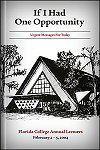
Urgency characterized Jesus' earthly ministry. He spoke of the importance of doing His Father's work, for "night is coming when no one can work" (John 9:4). He challenged His disciples to "lift up your eyes and look on the fields, that they are white for harvest" (John 4:35). A plentiful harvest still awaits; the Lord urgently needs laborers to go out into His harvest (Luke 10:2). The gospel is still man's only hope (Rom. 1:16). "Jesus Christ, and Him crucified" is still our urgent plea (1 Cor. 2:2).
We need to sense the urgency of the message of Christ today. Today, as ever, we as Jesus' disciples need to sanctify Jesus Christ as our Lord (1 Pet. 3:15), and prepare ourselves to share with those willing to listen to the message they need to hear. In this year's lectureship the speakers in the series consider the sobering question: What would I say if I had only one opportunity to speak to this person in this particular situation? Their messages will stir the hearts and challenge the minds of those who hear them. They are practical messages that are urgently needed today.
Contents:
- "Today is the Acceptable Time," by Ralph Walker
- "Jesus is the Answer," by Bob F. Owen
- "The Day of the Lord is Near," by John M. Kilgore
- "What I Would Say to My Children," by Jefferson David Tant
- "What I Would Say to My Elders," by David G. Barnes
- "What I Would Say to My Devout Religious Neighbor," by John R. Madrigal
- "What I Would Say to My Muslim Neighbor," by Mark Roberts
- "What I Would Say to My Parents," by Boyd Sellars
- "What I Would Say to My Preacher," by Paul B. Cook
- "What I Would Say to My Indifferent Neighbor," by Paul R. Blake
- "What I Would Say to My Brother or Sister Who Has Left the Lord," by Steve Patton
- "What I Would Say to the Members of My Congregation," by James Lusby
- "What I Would Say to Today's Teachers," by M. M. Broadwell, Jr.
- "What I Would Say to My Skeptical Neighbor," by Lonnie Fritz
- "What I Need Someone to Say to Me," by Floyd Chappelear
Daniel W. Petty is Chairman of the Biblical Studies Department and Professor of Biblical Studies and Social Science at Florida College.
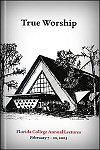
Among the greatest privileges afforded to man is the opportunity to worship the Creator—to bow down before Him in reverent acknowledgement of Who He is, to thank Him for His goodness, and to offer Him our praise. Worship gives meaning to a life devoted to serving God. Those who love and respect God's will also know the necessity of avoiding any form of "vain" worship (Matt. 15:19), and sense the duty to worship God "in spirit and truth" (John 4:24).
The speakers in this series focus on the meaning of worship, the importance of divine authority for acceptable worship, and the special nature of worship under the new covenant. The lessons also examine some of the current trends and challenging issues related to worship that Christians are facing. The speakers whose material appears in the book have provided you with valuable studies that will help you in your effort to worship and serve God faithfully.
Contents:
- "The Nature of God and Man," by Wilson Adams
- "In Spirit and Truth," by David Thomley
- "Devoted to Prayer," by Sewell Hall
- "Divine Authority," by Doy Moyer
- "New Covenant Worship," by Frank Himmell
- "The Ministry of the Word," by Grant Caldwell
- "Current Trends: The Charismatic Movement," by Warren Berkley
- "Upon the First Day of the Week," by Greg Litmer
- "The Table of the Lord," by Dick Blackford
- "The Collection for the Saints and the Common Treasury," by Frank Jamerson
- "Current Trends: The House Church Movement," by Jim Deason
- "The Role of Women in Worship," by Bill Robinson
- "Congregational Singing in Worship," by Tim Stevens
- "Instrumental Music in Worship," by Melvin Curry
- "Current Trends: Worship as Entertainment," by Allan Turner
Daniel W. Petty is Chairman of the Biblical Studies Department and Professor of Biblical Studies and Social Science at Florida College.
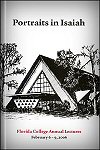
It is said that when Augustine, shortly after his conversion, asked Ambrose of Milan which book he should begin with in his study of the Bible, the answer he received was, "The prophecies of Isaiah." Isaiah has been called "the gospel before the Gospel." Homer Hailey, in the preface of his widely read commentary on Isaiah, referred to Isaiah as "the dean of all Old Testament prophets."
Isaiah's timeless message of faith in the "Holy One of Israel" is as relevant today as it was when he first delivered it. In a dark world given over to the futility of idolatry and false religion, Isaiah extols the glory and majesty of Jehovah. In an age of sin and unfaithfulness, the prophet declares God's absolute holiness and His infinite love. In a time of hopelessness and despair come a message of hope and a promise of human redemption through a Messiah—God's Servant.
This series of lectures calls us to a study of the prophesy of Isaiah. They present several "Portraits in Isaiah" to help us better appreciate this great man and his great message.
Contents:
- "Here I Am, Send Me," by Colly Caldwell
- "Come to the Waters," by Gary Ogden
- "Wings Like Eagles," by Dee Bowman
- "A Portrait of the Prophet," by David Holder
- "Portraits of Israel and Judah," by L. A. Stauffer
- "The Holy One of Israel," by Jeff Young
- "Portraits of Belief and Unbelief," by Bob Buchanon
- "The Lord's Vineyard," by Dan Madrigal
- "The Folly of Idolatry," by Tommy Peeler
- "The Rod of God's Angry," by Don Alexander
- "Look to the Rock," by Jeff Wilson
- "Portraits of the Messiah," by Tom Hamilton
- "Portraits of the Messiah's People," by Monte Hampton
- "The Suffering Servant," by Gary Fisher
- "The New Jerusalem," by Robert Harkrider
Daniel W. Petty is Chairman of the Biblical Studies Department and Professor of Biblical Studies and Social Science at Florida College.
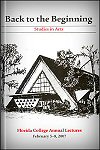
As the first page of church history, Acts provides an historical account of the first years of Christianity. As an apologetic treatise it demonstrates the church as the fulfillment of the Old Testament and as the victor over paganism. As a narrative of the life of the earliest disciples, it has a personal appeal that is not only informative, but provocative. Because of its emphasis on the first principles of the gospel Acts has a practical value in helping us understand and carry out the Lord's great commission to preach the gospel to all creation.
The Book of Acts is, of course, a continuation of Luke's story, the necessary sequel to his gospel of the life of Jesus of Nazareth. According to the inspired author, the things Jesus "began to do and teach" were recorded in his first account. The mission of the Messiah was passed on to His apostles, who carried on His work through the power of the Holy Spirit. The story Luke tells in Acts is the story of the divine origin of Christianity. The speakers for this lectureship will lead us "Back to the Beginning."
Contents:
- "All That Jesus Began to Do and Teach," by Dan Petty
- "The Conquering Kingdom," by Harold Comer
- "The Jesus God Raised Up," by Curtis Pope
- "The Role of the Holy Spirit," by David Posey
- "Preaching to Those Who Are 'Near,'" by Jason Longstreth
- "Powerful Preachers," by Phillip Mullins
- "The Early Christians and the Old Testament," by David Banning
- "The Way," by Johnny Stringer
- "Stephen's Sermon," by Rich Gant
- "Saul's Conversion," by Andy Diestelkamp
- "The Jerusalem Meeting," by Sid Latham
- "Preaching to Those Who Are 'Far Off,'" by Scott Finley
- "Dealing with Internal Challenges," by Norman Fultz
- "Dealing with External Obstacles," by Bob Watson
- "Preaching to Convert Men's Hearts," by Charles Spence
Daniel W. Petty is Chairman of the Biblical Studies Department and Professor of Biblical Studies and Social Science at Florida College.
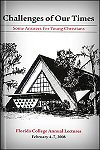
As in Paul's day, we today are engaged in a great battle of ideas. Systems of thought that are part of our culture are posing serious threats to those who hold to a biblical world view. Walking by faith becomes increasingly difficult in the face of these challenges. Young Christians, especially, often find themselves facing difficult questions regarding their faith and are looking for help with their answers.
The lessons in this series examine common challenges to the faith of Christians—especially young Christians. Some of these challenges have to do with the authority and integrity of the Bible, the uniqueness of Christianity, ethics, and morality, and intellectual and social tensions of our culture. The speakers have provided some valuable help in dealing with these challenges.
Contents:
- "Challenges of Our Times," by Thaxter Dickey
- "Why Right is Right and Wrong is Wrong," by David McClister
- "Truth and Certainty in an Age of Doubt," by Lawrence Kelley
- "How Can I Be Sure the Bible Doesn't Contain Mistakes?," by Doy Moyer
- "How Can I Be Sure the Bible Includes the Right Books?," by Tom Hamilton
- "Why Should I Follow the Bible?," by Max Dawson
- "What is the Difference Between Them and Us?," by Earl Robertson
- "Where Do I Draw the Line?," by Edwin Crozier
- "Are There Moral Dilemmas in the Bible?," by L. A. Stauffer
- "How Can I Be an Honest Person?," by Jason Moore
- "What Can I Do Now That I've Messed Up?," by Mark Broyles
- "Are All Religions Equal?," by Ed Sanderson, Sr.
- "How Can I Deal With Social Pressures?," by Rick Lanning
- "How Should I Regard Modern Science?," by Doug Northcutt
- "Can I Get a College Education Without Compromising My Faith?," by Brian Crispell
Daniel W. Petty is Chairman of the Biblical Studies Department and Professor of Biblical Studies and Social Science at Florida College.
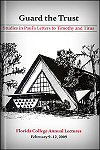
Paul's admonitions to Timothy and Titus have stirred the hearts of generations of fellow servants committed to the same work of fighting the good fight of faith. The studies in this series deal wit the issues and concerns Paul addressed: the vital need for sound doctrine; the work of elders, deacons, and evangelists; the important role of women; and conduct in the household of God. The challenge to "guard what has been entrusted" resonates throughout all three epistles and is as relevant today as ever. This volume contains manuscripts of the lectures presented on this topic. In order to further enhance the value of this book for students of these epistles, an introductory chapter by Tom Hamilton is included.
Contents:
- "Guard the Trust," by Sewell Hall
- "Fight the Good Fight," by Harry Pickup, Jr.
- "I Know Whom I Have Believed," by Paul Earnhart
- "Do the Work of an Evangelist," by Ferrell Jenkins
- "Elders Who Rule Well," by Terry Slack
- "Let Them Serve as Deacons," by Bobby Schrimsher
- "Women Making a Claim to Godliness," by Jeff Archer
- "A Tranquil and Quiet Life," by David Curry
- "Zealous for Good Works," by Run Drumm
- "The Uncertainty of Riches," by David Hartsell
- "To Be Sensible," by Scott Owen
- "Let No Man Despise Your Youth," by Bubba Garner
- "Correcting Those Who Are in Opposition," by Jeff Himmel
- "Suffer Hardship," by Tommy Hagewood
- "Discipline Yourself for Godliness," by Al Diestelkamp
Daniel W. Petty is Chairman of the Biblical Studies Department and Professor of Biblical Studies and Social Science at Florida College.
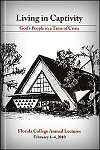
The 2010 Florida College Lectureship is based on Old Testament accounts of the crisis of the Babylonian exile. The lessons provided here call attention to the bitter experiences of captivity, and how those experiences speak to God's people today. The speakers in this series examine various texts from that period and show how the lessons they teach are relevant for Christians in our modern situation.
The evening lectures all maintain an absolute focus on God—past, present, and future. Tuesday's lectures focus on the past problems that led to the captivity; and Thursday's lectures focus on questions regarding the future hopes and expectations of God's people in captivity.
Contents:
- "The Sovereign Lord of History," by Melvin Curry
- "Our God is a Consuming Fire," by Tommy Peeler
- "The God of Hope: Can These Bones Live?," by Ray Madrigal
- "The Incurable Wound," by Colly Caldwell
- "Trusting in Gods That Cannot Save," by Leon Mauldin
- "Who is To Blame for This Mess?," by Monte Hampton
- "The Wages of Sin: Your House is Left Desolate," by Kevin Kay
- "Wrong Responses to Captivity," by Mark Roberts
- "Purity in an Unclean World," by Albert Dickson
- "Submit to the King of Babylon," by Allan Turner
- "Seek the Welfare of the City," by Keith Ward
- "Will Good Come Out of this Evil?," by Jason Longstreth
- "How Will We Live in a Foreign Land?," by Paul Ayres
- "Where Will We Worship?," by Frank Jamerson
- "When Will Our King Return?," by Bob Hutto
Daniel W. Petty is Chairman of the Biblical Studies Department and Professor of Biblical Studies and Social Science at Florida College.
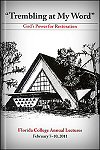
The 2011 Florida College Lectureship presents studies based on the Old Testament story of Judah's return from captivity. This year's series serves as a sequel to the 2010 lectureship that dealt with the crisis of living in a time of captivity. The lessons presented here deal with the great theme of restoration and the need for God's power and guidance in any restoration effort. Thus they are especially relevant and vital for those of us who are committed to the ideal of restoration of primitive Christianity in our time.
The lessons in the series are arranged around the biblical texts associated with that original story of restoration, and highlight the important challenges facing God's people then and now. Tuesday's lectures focus on the era of Zerubbabel (Ezra 1–6; Haggai; Zechariah 1–8); Wednesday's lectures on the era of Ezra (7–10) and Nehemiah; and Thursday's lectures deal with the era of Malachi and the distant future of God's people (Isaiah 40–66). The evening lectures are drawn from the inspiring themes of Isaiah 40–66.
Contents:
- "'Come Out From among Them': God's Call to Restoration," by Buddy Payne
- "'Trembling at My Word': God's Power for Restoration," by Doy Moyer
- "'The New Heavens and the New Earth': God's Promise of Final Restoration," by Don Truex
- "'The Sound of Weeping and Joy': Courage to Attempt Restoration," by Mike Wilson
- "'They Discouraged the People of Judah': Opposition to Restoration," by Kent Heaton
- "'Not By Might, But by My Spirit': God's Commitment to Restoration," by Matt Qualls
- "'Consider Your Ways': Our Commitment to Restoration," by Larry McClenny
- "'Set His Heart to Study the Law': The Pattern for Restoration," by Tom Kinzel
- "'According to the Law': The Pattern of Restoration," by Mike Bozeman
- "'Let Us Arise and Build': The Distinctiveness of God's People," by Ryan Boyer
- "'They Confessed Their Sins': Repentance and Restoration," by Roy Diestelkamp
- "'You Have Turned Aside': Restoration As an Ongoing Work," by Gary Henry
- "'The Day Is Coming': Restoration and Judgment," by David Bunting
- "'House of Prayer for All Nations': Restoration for All People," by Bob Waldron
- "'The Lord Has Anointed Me': Restoration As Defined by the Messiah," by David Thomley
Daniel W. Petty is Chairman of the Biblical Studies Department and Professor of Biblical Studies and Social Science at Florida College.
Reviews
10 ratings

Brandon James Trout
6/25/2018
I don't know who saw to it to make these available in Logos format, but thank you!
Faithlife User
2/8/2018
David Groseth
5/11/2017
Since there is no Type:Lecture all 38 of these are in the catch all Type:Monograph - If you want to browse through them in your library, search for series:florida or series:flo - For all lecture series search for series:lectu - also try title:lectu and tag:lectu -or combine 2 or 3 with a search like series:lectu OR title:lectu OR tag:lectuNorm Fields
5/16/2016
This is a set I would sure love to have! Just for the chapters by Homer Hailey, if nothing else. I'll have to put this on my Birthday/Father's Day/Christmas list.Wallace Scaife
7/21/2015

John F. Maddocks
2/4/2015
Fantastic resource, and what a wonderful surprise to discover they're available on Logos. Will future volumes, 2012 on, be added?
Jaycu49
11/12/2013

Bill Shewmaker
8/16/2013

Tim Caldwell
7/19/2013
